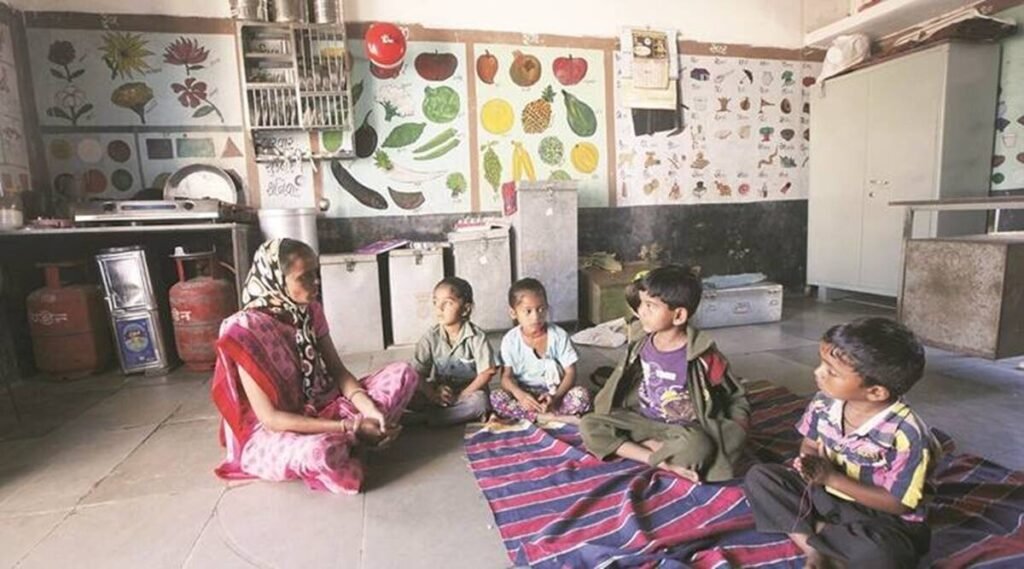Why in news?
Being closed since the April 2020-lockdown, Anganwadis are slowly reopening. Those in Karnataka, Bihar and Tamil Nadu are opening or considering opening shortly.
What is it?
Anganwadi means “courtyard shelter”. It is a type of rural child care centre in India and works as day care centres. They were started by the Indian government in 1975 under the Integrated Child Development Services (ICDS) program to combat child
hunger and malnutrition.
The scheme is being implemented by the Ministry of Women and Child Development. Anganwadi centres provide a package of six services- supplementary nutrition, immunisation, pre-school non-formal education, nutrition and health education, and referral services.
Beneficiaries of this scheme are children in the age group of 0-6 years, and pregnant women and lactating mothers.
Significance of Anganwadis-
Anganwadis play a crucial role in supporting households, particularly from low-income families, by providing childcare, health and nutrition, education, supplementary nutrition, immunisation, health check-up and referral services.
What are the challenges faced by Anganwadis?
- Lack of Education and Training: Most anganwadi workers are not well-literate and their skills are limited. NITI Aayog also suggested that anganwadi centres should be provided with the required number of workers and they should be upgraded through regular training
- Lack of Education and Training: Most anganwadi workers are not well-literate and their skills are limited. NITI Aayog also suggested that anganwadi centres should be provided with the required number of workers and they should be upgraded through regular training
- Lack of help from community: The community participation or help from the community was not always made available and when required some times people help in food distribution if worker was busy with some other activities.
- Insufficient Learning Environment: Anganwadi centres do not seem to provide the conducive environment that encourages parents to leave children at these centres. Only a limited number of AWCs have facilities like creche, and good quality recreational and learning facilities for pre-school education.
Following measures have been taken for upgradation of facilities at Anganwadi Centres:
- Revised joint guidelines were issued by Ministries of Women & Child Development, Rural Development and Panchayati Raj for construction of 4 lakh Anagnwadi center buildings across the country under Mahatma Gandhi National Rural Employment Guarantee Scheme (MGNREGS) in convergence with Anganwadi Services (ICDS Scheme).
- Under Swachhta Action Plan, Rs.10,000/-per AWC is provided for drinking water facilities and Rs.12,000/- per AWC for toilet facilities.
- Grants are sanctioned for purchase of water filter, furniture, equipment, etc.
- Anganwadi Workers (AWWs) have been provided with Smart Phones for efficient service delivery
Benefits of Reopening Anganwadis-
- By reopening anganwadis, women will get more time to focus on her health and even can do some economic work.
- Children can get reach their full potential by getting services of Anganwadi centre.
Conclusion-
Anganwadi workers play a vital role of bridge between the community and the ICDS. They play an active role in bringing the services to the door step of the beneficiaries. They should be equipped with best quality facilities, technological upgradation as it will help to create a healthy India.
In order to boost coverage as they reopen, large scale enrolment campaigns, that worked in Gujarat, may help mobilise eligible children.
Integrated Child Development Services (ICDS)-
- This scheme was launched on 2nd October, 1975 and it is one of the flagship programmes of the government of India and represents one of the world’s largest and unique programmes for early childhood care and development.
- ICDS scheme is under the Ministry of Women and Child Development.
- This programme was launched to tackle the challenges of malnutrition, morbidity, reduced learning capacity and morbidity on the other hand.
Objectives of the Integrated Child Development Services (ICDS) scheme are as follows:
- To improve the nutritional and health status of children in the age group 0-6 years.
- To lay the foundation for proper psychological, physical and social development of the child.
- To reduce the incidence of mortality, morbidity, malnutrition and school dropout.
- To achieve effective co-ordination of policy and implementation amongst the various departments to promote child development.
- To achieve effective co-ordination of policy and implementation amongst the various departments to promote child development.
